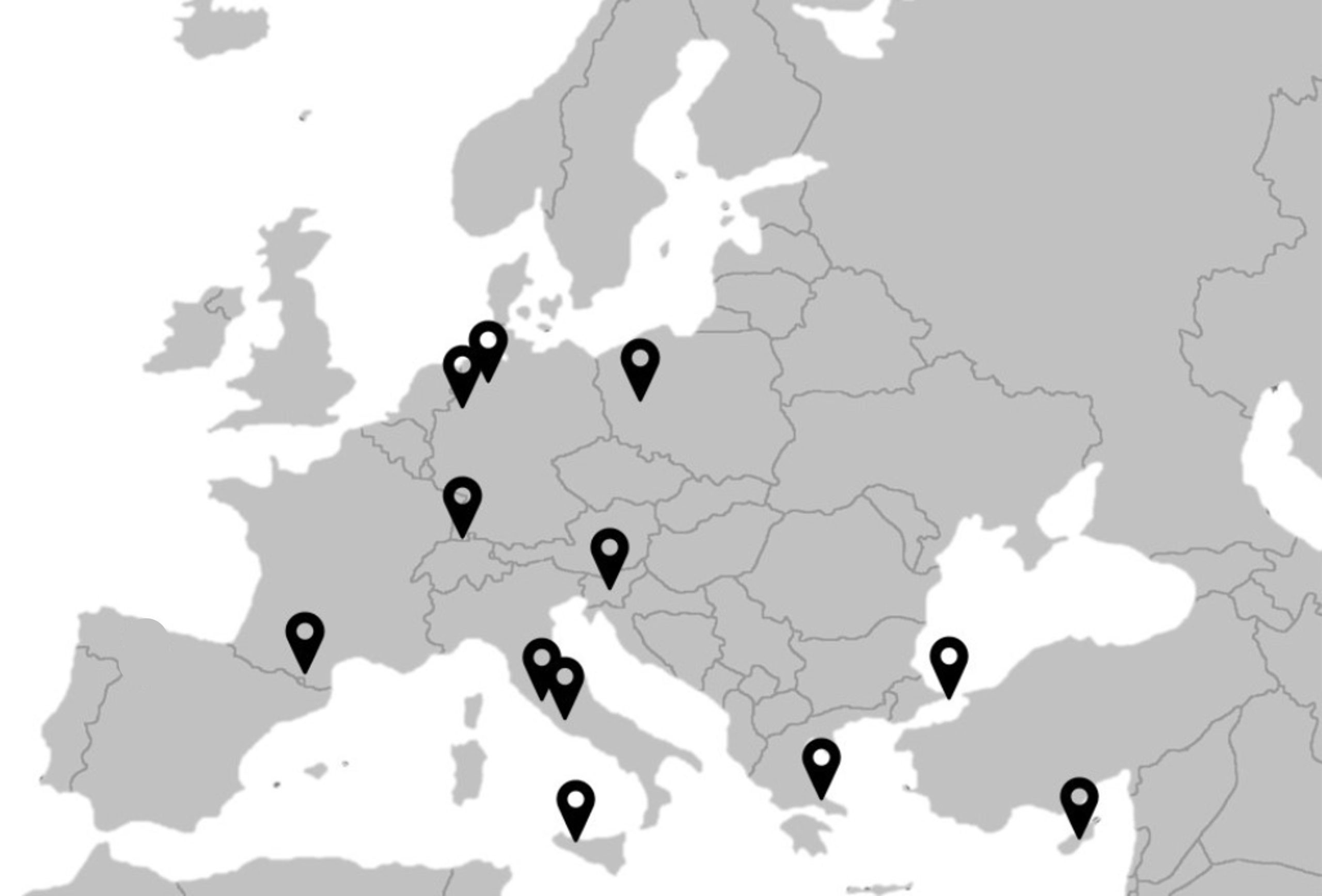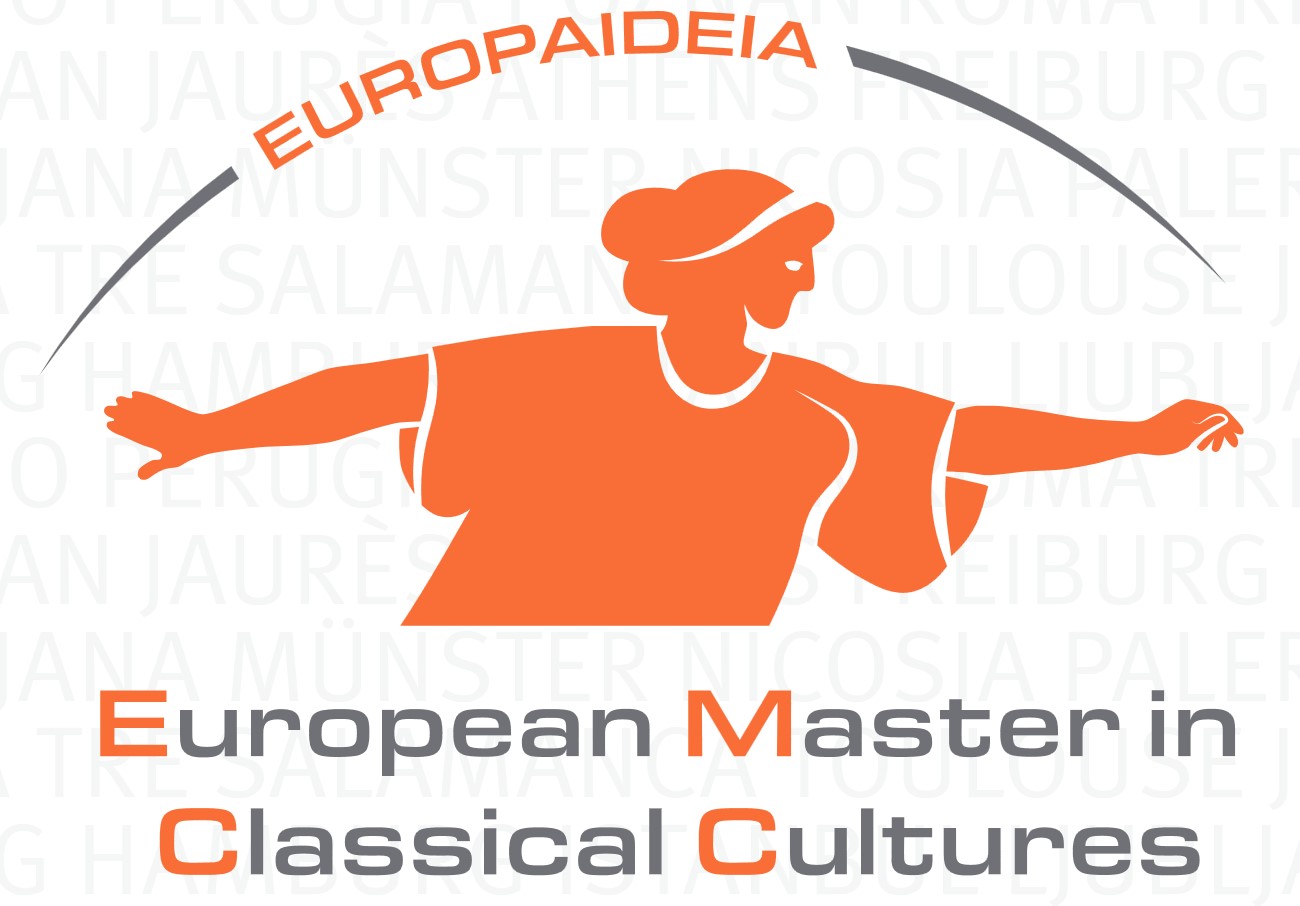Curriculum
Qualification Goals of the EMCC
The qualification goals of the programme are: expert knowledge, and superior interdisciplinary, problem-oriented analytical, representational and communicative skills in the field of Classical Studies both of which will qualify the students for their doctoral thesis, continued academic work and the employment in the cultural sector. Particular emphasis is laid on language skills, intercultural competences and a natural awareness of international cooperation in order to professionalise the students in for the European and international employment markets in scholarship, education, and culture.
Structure of the Curriculum
In view of the variety of designations that are used at the different universities for the sub-division of study programmes and individual courses, the following terms will be employed for the EMCC: large thematic units will be referred to as “Modules.” Each module consists of classes which – regardless of differences in organisation – will be referred to as “Courses.”
The study programme is subdivided into three study areas:
- Core Modules
- Advanced Modules
- Extension Modules
Further elements are interdisciplinary compact courses and a placement phase.
The core modules comprise three main subjects: Ancient History, Classical Philology and Archaeology plus a total of 5 modules which ought to be selected at the ratio of 2:2:1.
The core modules are split into introductory and speciality modules. The introductory module will impart the basic knowledge for each core module. Since admission to the EMCC programme requires basic expert knowledge for at least two core modules, students may only attend a single introductory module in one core module and ought to select their speciality modules accordingly. Whether an introductory module in any of the core modules is necessary at all will be decided during the admission procedure.
The two advanced modules are designed to improve methodological and language skills.
Building on the studies pursued in the core and advanced modules, the extension modules aim at professionalising the students further by expanding geographic and historical knowledge in the pertinent field, and by deepening the understanding of methodological problems.
The week-long interdisciplinary compact course (blockseminar) will be organised by the local coordinators and take place once a year at changing locations. It provides students with the opportunity to present and discuss the main points of their ongoing Masters thesis internationally.
The placement offers the opportunity to gain hands-on or practice-oriented experience. As a rule, the placements will be organised in cooperation with leading institutions, as, for instance, with one of our partners, the Deutsche Archäologische Institut.
Click here for an overview of the study modules
Mentoring
Prior to the beginning of the studies, the students’ academic specialties and specific interests will be assessed, in order to encourage a thoughtful organisation of the study plan right from the start.
The mentoring programme is a key element in the organisation of the EMCC. Each student will be assigned a personal mentor who is a member of staff at the university where the student begins the programme. In the course of the studies, other mentors, usually from the universities where the students have taken part of their exams, will support the student.
Profiles and Aims
The unique profile of the EMCC is marked by both its specific international and interdisciplinary design and its aim to promote academic excellence. The obligation of each student to study at no less than two universities teaching in different languages forms the basis of this international programme. Each of the universities at which a part of the credits necessary for a successful completion of the programme has been validated will award a Masters degree (double or multiple).
The participation of a great number of universities here offers a wide range of sub-disciplines in the field of Classical Studies providing both a high degree of combination options and a European context. This European context forms an important part of the programme, which seeks to define the aspect of a European identity from its classical roots.
The diversity of the participating partner universities here provides a great opportunity to refine and extend the programme of study through restructured, complex studies and joint activities. Moreover, the diversity of languages, which characterises Greco-Roman antiquity as much as modern Europe, is emphasised. To enhance country-specific knowledge, excursions to or inspections of important European historical sites are to be integrated into the study plan.
Permanent coordination of the programme is ensured by regular meetings of the coordinating council consisting of representatives of the partner universities.
The EMCC addresses students who completed their first degree with excellent results. Thus, it is our aim to keep the number of first-year students to no more than 25 per year. The mentoring programme, which provides a minimum of two mentors from two universities with different national languages for each student, offers the solid support that secures an ideal study progress and professional advancement of each student.
The aims of the EMCC may be summarized as follows:
- the examination of the meaning of European identity from synchronic and diachronic perspectives,
- the promotion of interdisciplinary practices,
- the enhancement and dissemination of the rich tradition of academic discourse in different European languages inherent in each of the cultures,
- overcoming the limitations of the curriculum at the individual institutions within a well-structured and, at the same time, flexible study programme,
- the combination of Classical studies with the inspection of important historical sites within Europe.
In the course of the organisation and the implementation of the Masters programme, all three status groups of the participating universities – teachers, students, and administrative staff – will be included in the integration process of the European academic landscape.
The European Master in Classical Cultures therefore completely meets the requirements of strengthening the European dimension, the creation of a European Higher Education Area, and preparation for the European job market, which were set out in the Bologna process.

Partner Universities
European Diversity of the EMCC
The EMCC can be taken at 14 partner universities in 10 European countries. The contents of the programme will be taught in the national language of the visited university, and possibly also in English.

Application
We are looking forward to your applications for the European Master in Classical Cultures!
Click here for more information to the dates and deadlines for application.
Admission Requirements
BA or equivalent degree in a relevant subject (e.g., Diplom, Staatsexamen for Germany, Laurea for Italy, Licenciatura for Spain, Licence for France and Turkey, Ptychio for Cyprus) with a normal course duration of 6 semesters (3 years). Provisionally, a preliminary certificate covering the grades of the first 5 semesters (equivalent of 150 ECTS credits) may be submitted. Relevant subjects (in the domain of Altertumswissenschaft) are in particular Ancient History, Archaeology and Classical Philology. Certified pre-knowledge of at least two of these subject areas is required.
Language Skills:
- Certified knowledge of the language spoken at the university where the programme is taken up is requisite (at least C1 or native language), as well as certified knowledge of English (at least B2) and the language spoken at the university that the student intends to choose as partner university (at least A2 at the time of application, at least B1 at the start of the semester abroad).
- Knowledge of Ancient Greek or Latin is another requirement. At some universities, knowledge of both, Ancient Greek and Latin, is required.
The coordinating council will decide on the admission of graduates with particular subject combinations.
Your local coordinators will be glad to answer your questions about the EMCC.
Application Documents
Please hand in the following application documents:
- Application form
- Certificate of first academic degree. Should the leaving certificate not be available at the time of application, a preliminary certificate covering the grades of the first 5 semesters (equivalent of 150 ECTS credits) must be handed in. The leaving certificate is to be produced on course registration.
- Evidence of adequate language skills
- Curriculum vitae (please use EUROPASS form)
- Transcript of records
- Written application for admission to the EMCC in which you state your motivation, your main research interests, the prospective focus of your studies within the core modules, as well as your expectations about the Masters programme (max. 5 pages DIN A-4).
- Two references by university/college teachers
- If applicable, further documents that help support your qualification and motivation for the programme (e.g., work placement certificates or equivalent additional qualifications, your BA thesis, or a representative paper from your undergraduate studies)
Please apply to the university at which you wish to start the Masters programme.
The formal and content-related fulfilment of the admission requirements will be examined in the admission interview. During the interview, you will also have the opportunity to receive assistance with the planning of your course of study. Guided by the coordinator of your home university, you will also formulate a study plan for your semester abroad and submit it to the coordinator of the partner university preferably one semester before your stay.




